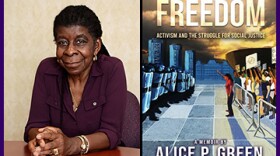The Center for Law and Justice in Albany is pressing on after its founder, civil rights activist Alice Green, died unexpectedly last month.
Alice Green was a mother, a grandmother, an aunt, social worker, politician and at times a one-woman civil rights movement. She died unexpectedly in August at 84.
Ta-Sean Murdock, who has been the center's director of operations for eight months, says the center is stepping up its fight against systemic racism.
“Dr. Green was really big currently on the reparations commission and doing work around the reparations commission to provide them with feedback necessary to make their recommendations on what they think reparations could look like here in New York state,” Murdock said.
Established last December, The New York State Community Commission on Reparations Remedies is tasked with examining the legacy of slavery, subsequent discrimination against people of African descent, and their continuing impact. Murdock says Green had immersed herself in it.
“One of the things that she really set out was for us to get the feedback of the community and what they feel reparations is, but educate them on it too, right? Because [the] community can't comment on reparations or provide feedback if they don't know what reparations is," said Murdock. "There were also dispelling some myths that reparations is only monetary, when reparations is actually a multitude of things. Reparations can come in the form of services, i.e. zero use detention. Reparations can come in the form of monetary value. It can come in owning property, you know. So there are many aspects to reparations and what that looks like. And she really wanted people to know about the various. Forms of reparations and how it could look in New York state, and so that was the framework.”
Murdock says the center continues its broader mission to help people in the community navigate difficult circumstances and life's complications as well as combating systemic racism.
“There are some people counting on the fact that Dr. Green is no longer here and that the work will stop, or things will get quiet," Murdock said. "I want to be clear that that's far from the case. We are all very committed to continuing the work that Dr. Green started, continued, and I wouldn't say finished, because she would tell you, if she was sitting here right now, that the work isn't finished. She did an interview or a presentation with John Brown Lives recently, and one of the things that she said, and she would always say, it, was that people of color, that she would not see people of color as equal until people could walk in the room who are people of color and be seen as the same person, and until we get there, we're still in the struggle. If I can't walk in a room as a person of color and especially as an African American male, and be seen on the same level, playing as everyone else in the room, then we're not equal.”
Murdock says the center's activities stopped for just the day after Green died, and were back in full swing the next.
“People have asked me this multiple times like, ‘hey, if, if they offer, if someone offered you the executive director role, would you take it?’ And what I've said, and I'll continue to say, is, it's not, it's not about me, and whether or not I decide to take a role or not. You know what the important piece, I think is? Well, let me go here: Dr. Green would always say that there are things that create distractions, and so what I don't want is to create a distraction, or for the community to worry about the center of finding a leader, you know, at this point, or you know, our goal right now is, is to continue the work that Dr. Green has started. Dr Green was working right up until her last moment. And so, you know, right now our focus is to push the things that she wanted us to push,” said Murdock.
Another component of Green's legacy is a few blocks away from the center: she had been stepping up efforts to rejuvenate the Alice Moore Black Arts and Culture Center, which had sprung from the ashes of the former African American Cultural Center of the Capital Region. The entity shuttered a year ago after falling on hard times and losing its not-for-profit designation. Murdock says the new organization is filling its fall calendar, beginning with a tribute to Green Sunday at 3 at the Palace Theatre.
"We'll have a ‘Dr. Green Community Day,’ where there will be vendors and music and performances and those things," Murdock said. "And then in a few weeks, in October, we'll have an open house at the center, and we'll put information about that open house on our Facebook page for people to see. And then that same day, there was an organization that worked with Dr. Green called H.O.L.L.A.! [How Our Lives Link Altogether]. And so they'll be here in Albany showing their documentary. So there will be an open house on that day, and then a film showing, and we'll do that at Albany Housing Authority. And then AMBAC will be doing a Motown night November 2.”









